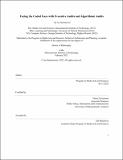Facing the Coded Gaze with Evocative Audits and Algorithmic Audits
Author(s)
Buolamwini, Joy
DownloadThesis PDF (62.58Mb)
Advisor
Zuckerman, Ethan
Terms of use
Metadata
Show full item recordAbstract
Increasing numbers of real-world examples show that algorithmic systems can amplify racism, sexism, ableism, and other intersecting forms of discrimination. I created the term “the coded gaze” to describe the ways in which discrimination and other harms are embedded into algorithmic systems. Algorithmic audits have emerged as a mechanism to surface the technical limitations of these systems that have negative social implications, yet these audits by themselves do not necessarily lead to stakeholder engagement that can mitigate algorithmic harms. Algorithmic audits also provide evidence of systematic discrimination in algorithmic systems using decontextualized metrics, but these by themselves do not show the human costs at play. In this thesis, I conceptualize the evocative audit as an approach to humanizing the negative impacts that can result from algorithmic systems. I introduce the counter-demo as a necessary component of evocative audits that allows others to bear witness to issues created by algorithmic systems of interest. I build on the insights of Black women intellectuals to show how Black feminist epistemology, intersectionality, and the outsider within standpoint provide avenues for shaping audits of algorithmic systems that reach everyday people.
I present two case studies of an impactful algorithmic audit (Gender Shades) and an evocative audit (AI, Ain’t I A Woman?) that have reached over 1 million people worldwide. The cases show how in combination, algorithmic audits and evocative audits provide complementary evidence to reach stakeholders beyond academic circles and increase public awareness about algorithmic harms. I outline strategic considerations about key strengths, limitations, and risks of each audit type to offer a roadmap for fellow artists, advocates, and academics who aim to combine performance metrics and performance arts to push for algorithmic justice.
Date issued
2022-02Department
Program in Media Arts and Sciences (Massachusetts Institute of Technology)Publisher
Massachusetts Institute of Technology